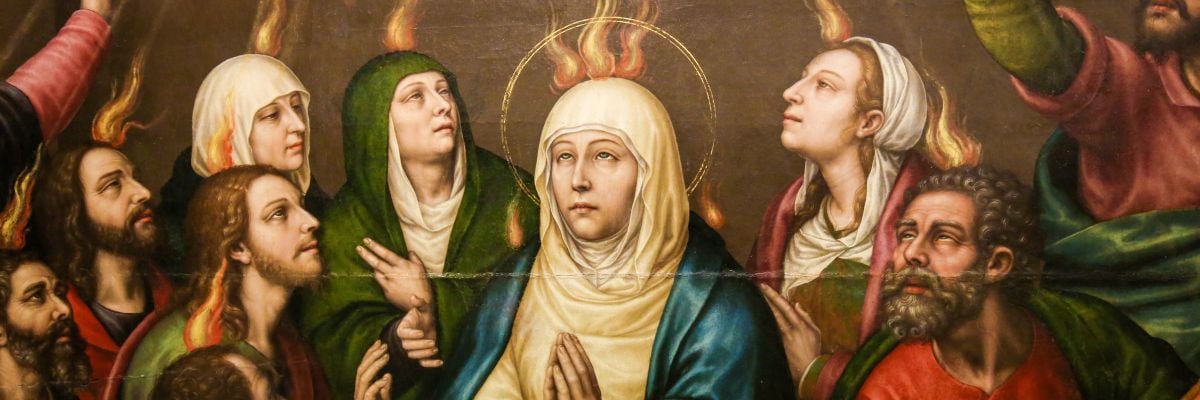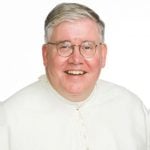
Homily for Pentecost Sunday, 2020
This Spirit he did confer upon the Church, sending throughout all the world the Comforter from heaven, from whence also the Lord tells us that he saw the devil, like lightning, was cast down (Luke 10:18). Wherefore we have need of the dew of God, that we be not consumed by fire, nor be rendered unfruitful, and that where we have an accuser there we may have also an Advocate (1 John 2:1).
-St. Irenaeus of Lyon, Against Heresies, read at the Office of Readings on Pentecost Sunday
Often enough the great feast and mystery of the Descent of the Holy Spirit on Pentecost is called “the birthday of the Church.” This is true enough, but we need to broaden our notion of what the Church is and when it began in order to understand the meaning of the mystery that we celebrate each year fifty days after Easter and on which we meditate often in our praying of the holy rosary.
First off, the Church did not begin simply at Pentecost; it is much more ancient than that. The Church was, in fact, the first thing that God created when he began to create “all things visible and invisible.” The Church began when God first created the innumerable hosts of angels in their hierarchies and choirs. These angels were created in grace and were to be tested in order to enter in to their full beatitude, the face to face vision of their Creator, the Blessed Trinity.
Here is where the trouble entered. God created man in his own image, male and female, and they and their descendants were to be tested likewise so as to enter into the same beatitude enjoyed by the angels. According to biblical and patristic tradition, a third of the angels revolted against this elevation of embodied man to the same destiny as that of the bodiless spirits. In their pride they loved their own proper perfection such that they were jealous of its being shared in common with lowly creatures made from the dust of the earth.
Having lost the hope of the vision of God, the jealousy of the fallen angels turned to bitter envy, and so they conspired to make man fall as they had fallen.
Thus is was that our first parents fell as the angels fell from their state of grace and original innocence, deceived into disobedience by the wiles of Satan. Ever after, the demons constantly accused the human race before God and sought to drag us more and more deeply into sin.
The Holy Trinity’s eternal counsel determined a way of salvation for man, foretold to Adam and Eve: a coming Savior, the seed of the Woman, who would crush the ancient serpent’s head and bring restoration and redemption to the fallen human race. This was a further grave offence to the pride of the demons: human nature not only beatified, but made divine in Christ, that is, higher than the angels!
And so the Son of God, the Second Person of the Blessed Trinity, descended from heaven and assumed to himself our human nature in his own person, Jesus, the Son of Mary, the Savior of the human race. He underwent death for our salvation and rose from the dead by his own power, freeing the dead from the prison of hell and lifting them up to heaven in his ascension.
So here we have two falls: the irreparable one of the demons, fixed in their malice and driven from heaven, and that of man, capable of change because of his changeable nature, but reparable by the God-Man alone.
But as there were two falls in creation, so too there were to be two descents from heaven to bring about salvation and finally to overcome the devil and his fellow fallen angels.
This second descent we celebrate on Pentecost: the descent of the Holy Spirit, giving those who had been given God’s grace in redemption by the blood of Christ the power to do battle with the devil and bring the salvation of the human race to its completion on the last day.
So we have a guilty fallen Adam and his children raised up again by the innocent second Adam, God the Son in his descent into Mary’s womb and among the dead and we have the malicious fallen accuser (for this is what the word satan means in Hebrew) overcome by the descent of God the Holy Spirit. Two falls, two saving descents, two spiritual creatures—angels and men— saved by Christ and protected and defended by the Spirit come to dwell in them.
As co-heirs with Christ we form one Church with the angels of whom he is the head as the Son of God. Thus the scriptures call them “sons of God,” and call us also sons of God since we are so by the power of the Holy Spirit poured out by Christ in the sacraments of the Church, which work by the action of the same Holy Spirit.
This is the “hidden” but also very real and evident history of our Church, born before the ages with the angels in heaven, and born in time on Pentecost Sunday by the overshadowing of the Spirit suddenly falling upon Mary and the disciples in the Cenacle.
Thus Mary has her own special place in all this. Protected from the fall by the grace that made her the New Eve, she lived in the company of the unfallen angels, of which she is queen, and when the Spirit descended on her, the Son descended from heaven and took our nature from her to redeem it. Fitting it was, then, that she was with the apostles and disciples on Pentecost, bringing the Body of Christ to a new birth among men by her mediation and intercession: mother of the Son, spouse of the Spirit, and mother of the Church, Christ’s whole Body.
St. Irenaeus’s testimony in all this is precious, for he was the disciple of St. Polycarp who was the disciple of St. John. His works show the full Catholic faith from the beginning without a doubt. Thus Irenaeus calls her in the same work also an advocate, a paraclete, after the name of her divine Spouse, the advocate and comforter of souls, the Holy Spirit.
The Spirit draws the Church to her, so that he and she may protect us from the accuser who, as Revelation says, accuses the brethren “night and day before God.”
St. Paul tells us that we do not know how to pray as we ought, and that therefore the Spirit prays in us “with unutterable groanings.” These groanings are the prayers of Mary our advocate keeping us safe until we are finally home in the coming of her Son and the fullness of his Church above and below. Thus it is that Revelation also tells us, “The Spirit and the Bride say ‘Come.’” Yes, “Come Lord Jesus.”
We are all included in the Bride as members of the Church of Christ. So if we have any sins or defects that weigh us down, let us not listen for an instant to the accuser but run to our comforters and advocates, the Spirit of the Father and the Son and the mother of the Son and spouse of the Spirit!



